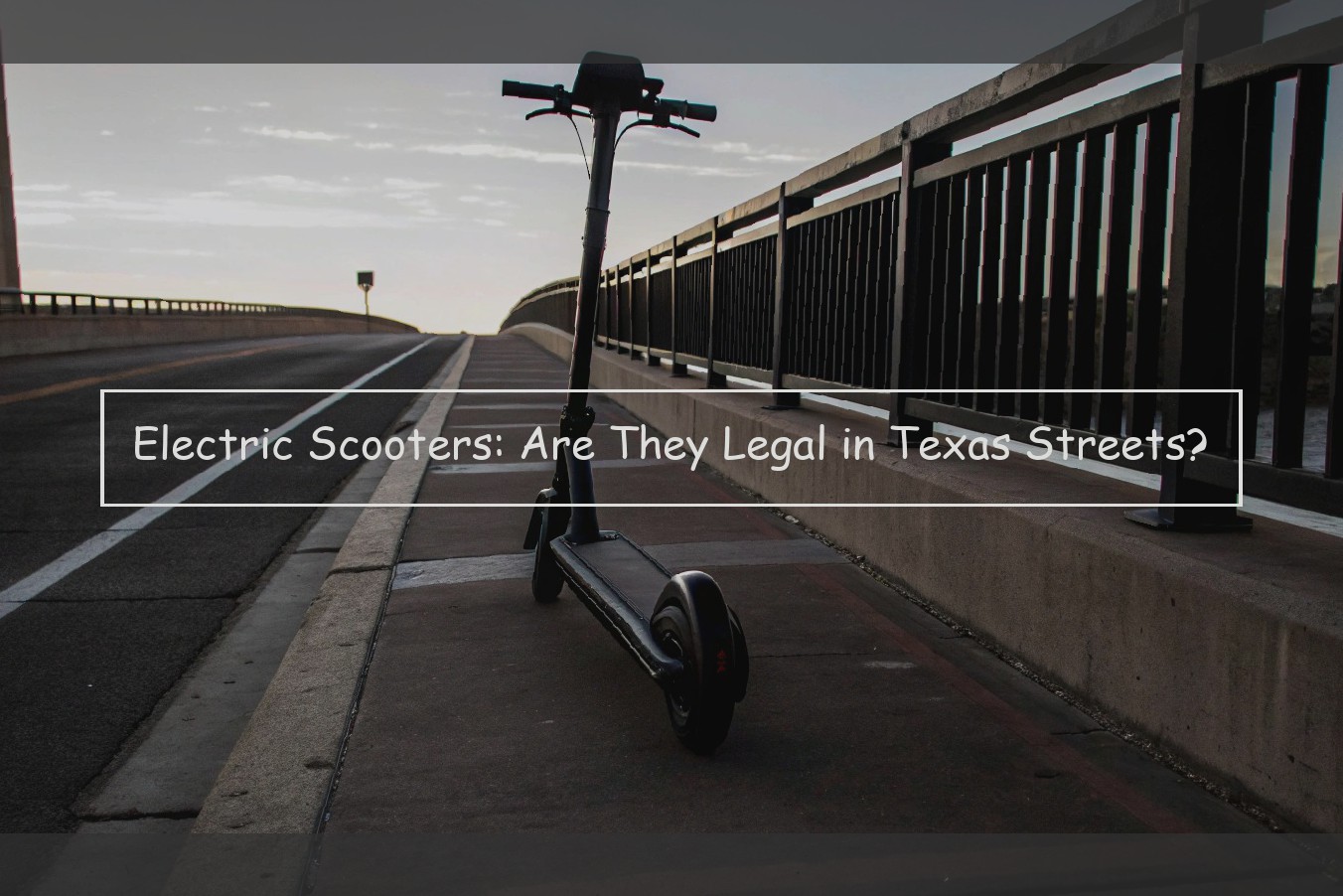Texas Scooter Laws Explained
Electric scooters in Texas are subject to state regulations, primarily under Texas Transportation Code Section 551.351 and 551.352. The general rules concerning electric scooters include the following:
• Definition of Electric Scooters – Texas law defines an electric scooter as a "device with not more than three wheels that can be stood or sat upon by an operator and is designed to be propelled by an electric motor, human power, or other propulsion (Texas Transportation Code Section 551.351(a)(1))." Segway scooters and hoverboards all meet this definition of electric scooters.
• Where Electric Scooters are Allowed to Ride – Electric scooters are allowed to be used on (1) a road or highway, (2) a shoulder of a road or highway, (3) a path set aside for the exclusive use of bicycles, or (4) a sidewalk (Texas Transportation Code Section 551 . 352(c)).
• Where Electric Scooters are Prohibited to Ride – Electric scooters are prohibited from being used on the following (a) a sidewalk except on a bicycle path or if necessary to enter or leave a roadway (Texas Transportation Code Section 551.352(b)).
• Electric Scooter Licensing Requirements – A person operating an electric scooter must be at least 15 years old (Texas Transportation Code Section 521.201(a)(1)), have a valid Texas learner’s permit or driver’s license (Texas Transportation Code Section 521.201(b)); and the electric scooter must be registered (Texas Transportation Code Section 551.352(e)).

State vs. Local Laws
It is worth noting that the statewide rules may differ from city or municipality to municipality throughout Texas. For example, in Austin, the chapter on "Electric Personal Assistive Mobility Devices" in its Local Traffic Ordinance states that these devices include but are not limited to electric bicycles, electric scooters and hoverboards. It also states that an operator of a personal mobility device must be at least 16 years of age, and must wear a safety helmet. The ordinance goes on to ban the operation of any personal mobility device on a sidewalk in a business district with certain exceptions.
By way of further example, Dallas has a chapter in its City Code titled "Operating Motor-Assisted Scooters." It defines a motor-assisted scooter much like the State defines "electrically operated mobility device." The Dallas ordinance breaks down the definition of motor-assisted scooter, into three subcategories: electric scooters, kick-scooters, and electric bicycles that have operating speeds over 20 miles per hour. The Districts of Downtown, Oak Lawn and the Arts District contain additional restrictions on where users of "scooters" can ride. There are also statutes governing electric scooters in cities like Houston, Plano, and Galveston, but for the purposes of this blog I will not flesh out those provisions, as those will likely be addressed in the other posts. However, as can be seen, there is some discrepancy in certain areas of Texas as to what the local rules are, as compared to what the State has in place.
Rider Safety Equipment Requirements
The law does not require riders of electric scooters to wear a helmet or to wear any other safety gear. However, the law does require that if you are under 17 and riding a scooter on a public roadway you have to wear a helmet. Of course, many riders will intuitively elect to wear safety gear like a helmet and elbow or knee pads.
There are certain safety requirements for the scooter itself. Electric scooters with a motor that has a maximum speed of 35 miles per hour need to be equipped with:
Electric scooters do not have to be inspected or registered in Texas. Owners are not required to display license plates on electric scooters, but a lot of riders do. That’s because while most officers are familiar with the street-legal scooters that are around town in more urban areas others may not know what exactly is street legal. Having a license plate may reduce the likelihood that you will be stopped. This can help keep you out of the legal system and can reduce your legal fees as well. The law also does not have specific penalties for failing to wear a helmet or other safety gear, and police officers generally do not stop people to check for violations. There are no minimum requirements for safety equipment under the law and police officers do not generally inspect scooters as part of a normal traffic stop. However, the officer should thoroughly evaluate the circumstances of each traffic stop to determine if a citation is warranted.
Fines for Citations
As with all traffic laws, noncompliance with Texas electric scooter regulations can result in fines and other legal repercussions. As mentioned in the previous sections, an operator must be at least 15 years of age and have a category M license or instructional permit. If a cyclist does not have the required license or permit, they are subject to a fine of up to $200.
Cyclists must operate their scooters on streets with posted speed limits of 25 miles per hour or less unless there is signage prohibiting the activity. Those who violate this rule face a $500 fine.
Section 551.352(c) of the Texas Transportation Code states that cyclists should always yield the right-of-way to pedestrians, motor vehicles, and public transportation. Failure to do so can also result in a $500 fine.
Another statute, 551.356 of the code, holds that "a person may not park a motorized mobility device or an electric bicycle or motorized scooter on a facility or portion of a facility if required by regulation to park only on a portion of the facility that is located in the public right-of-way." Violators of this regulation may face a $500 fine for each offense.
Further , violators of section 551.356(b) must pay a $500 fine for each offense. This provision states that "a person may not operate a bicycle, electric bicycle, motorized scooter, or motorcycle on a sidewalk or bicycle path unless the pathway is expressly designated as a shared-use path or the operator is riding in accordance with Subsection (c)."
In addition to these regulatory fines, individuals may also be vulnerable to civil liability for any injuries they cause while violating Texas electric scooter regulations. For example, if a cyclist without a license strikes another person while operating a scooter, the individual could face prosecution through the criminal justice system and suffer civilly through a personal injury lawsuit.
Because Texas currently lacks comprehensive legislation governing the use of electric scooters, these laws may evolve over time. It is critical that cyclists who choose to operate their scooters on Texas roads keep abreast of current statutes and regulations. Failure to do so could potentially come with significant legal repercussions.
Effect of Scooter Laws on Riders
The impact on Texas scooter riders is significant, as the vast majority of those who travel with electric scooters would prefer to be on public streets than on sidewalks. In most cities, even riders who legally are allowed to use sidewalks have no desire to pummel pedestrians into moving aside as they glide by on their scooters.
The bottom line for commuters who use scooters is that most Texas cities allow them to operate on the streets, which opens up the potential for rather severe injuries if they are hit by motorists, especially if the riders have temporary or permanent disabilities. And if they are hit on a sidewalk where it is against the law to be riding, they could face criminal charges, including fines of $500 or more.
Potential Future Changes
Both Austin and San Antonio have started discussions on the need for ordinances for the regulation of electric scooters. In June Austin created an Electric Scooter Work Group (ESWG) to help assess the growing demand for electric scooter transportation. The cities have been gathering data on electric scooters in order to evaluate their impact on infrastructure and transportation options. The Dallas City Council’s Public Safety Committee held its first briefing on the presence of electric scooters on city sidewalks and what regulations should be put in place. Dallas’s Mobility Solutions, Infrastructure, and Sustainability Council Committee will meet to discuss electric scooters in the coming months. At the last briefing on electric scooters , Austin staff outlined several options for regulating electric scooters:
Require operators to cap the number of scooters deployed at night or on weekends.
Create a "No Go Zone" to keep scooters away from certain areas.
Require parking/juicing spots only during certain times.
Permit parking for juicing in limited areas.
Establish a city-run parking/juicing program.
Establish defined service areas in the right-of-way in high demand‐areas.
Confine scooters to certain lanes (buffered or otherwise).
Require a safety sticker on all Austin‐based electric scooters.
Require electric scooters to have a loud enough warning beep.
Require electric scooters to use a reinforced restraining system.


